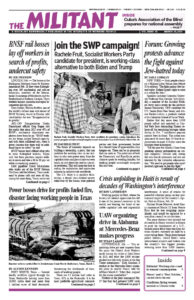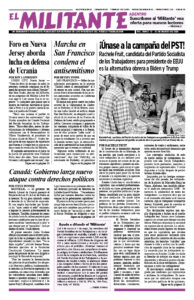LINCOLN, Neb. — The bosses at the Burlington Northern Santa Fe Railway announced Feb. 28 they were furloughing over 360 mechanical and rail-car inspectors, members of the International Association of Machinists and the Brotherhood of Railway Carmen. These workers inspect, maintain and repair locomotives and rail cars.
Days before, Warren Buffett, one of the world’s richest men and owner of BNSF Railway, based in Omaha, told stockholders he was “disappointed in its profits.”
AFL-CIO Transportation Trades Department official Greg Regan told the media that since 2015 over 41% of BNSF’s mechanical department employees have been let go. “BNSF workers are being pushed beyond capacity, and with these additional cuts, there is grave concern that there will be additional lapses in safety,” he said.
BNSF bosses have offered other jobs to some furloughed workers, Regan said, but those positions require workers to move and take a $6 to $8 pay cut while surrendering seniority.
IAM pipefitter David McAndrew, who works out of the BNSF Hobson Yard here, told the Militant, “I was awakened by phone calls and texts all day, saying the same thing, ‘Sorry you’re out of a job, and you get five days’ pay.’”
Last October, Union Pacific bosses furloughed 1,350 track-maintenance workers. Tony Cardwell, president of their union, the Brotherhood of Maintenance of Way Employes, sent a letter of protest to the federal government’s Surface Transportation Board saying Union Pacific will defer “much-needed maintenance on its right of ways, tracks, buildings, and bridges for the sole purpose of showing a larger profit to its shareholders in the fourth quarter” and that “will only lead to catastrophic outcomes.”
“With each employee the railroads furloughs and/or dismisses, it removes another worker to catch the next derailment disaster before it happens,” Jakob Forsgren, a track welder and chairperson of Local 1320 of BMWE here, told the Militant. “The result of a smaller workforce results in a more dangerous workplace and increasing the hazards of moving trains safely through communities.
“Rail workers today are being used like canaries were historically used in coal mines, to detect the presence of carbon monoxide,” he said. “The railroad bosses want to stop bringing in the canaries.”
Rail accidents, injuries up
The five Class 1 freight railroads operating in the U.S. — Union Pacific, BNSF, CSX, Norfolk Southern and Canadian National — reported 256 accidents on their main lines last year, an 11% increase over 2022. Derailments, the most common rail accident, were up 13.5%. “Obstruction accidents,” a train striking another object, and the second-most-common category, rose 21%.
Norfolk Southern had the most destructive derailment last year, when a freight train moving through East Palestine, Ohio, suffered an overheated wheel axle and derailed, dumping 50 cars on the ground, including 11 loaded with dangerous chemicals. The massive toxic fire that ensued poisoned the soil and water throughout the area.
Working people in East Palestine have waged a courageous fight there that has shown that neither the rail bosses nor the government and its regulators act in the interests of working people. Their resistance, alongside the protests by railroad unions, have forced out facts showing the disaster was inevitable. Similar disasters are to be expected as the layoffs and dangerous working conditions increase.
As this former rail worker and Militant correspondent was drafting this article, word came that a rail worker had to be taken to the hospital after being injured when a BNSF train struck a truck at an unprotected crossing 40 miles southwest of Lincoln, derailing 20 cars.
As these fights unfold, rail bosses are also taking aim at the unions’ ability to represent their members.
A SMART-TD union posting on Jan. 25 describes how the Union Pacific railroad is attempting to drive a wedge between the union and its members. It says UP tells workers that if they involve a local chairperson in a disciplinary matter that can double your probation period from 12 months to 24 and tacks on an instant 30 days out of work.
Fights over safety and work conditions are also unfolding in Canada, where 9,300 workers at Canada’s two biggest railroads — Canadian National and Canadian Pacific Kansas City — are currently in contentious contract negotiations.
“CN and CPKC aim to eliminate all safety-critical rest provisions from our collective agreements. These provisions are necessary to combat crew fatigue and ensure public safety,” Teamsters Canada President Francois Laporte said last month.
On Feb. 16 two crew members were injured when four CPKC locomotives slammed into a stopped train and derailed east of Revelstoke, British Columbia, sparking a fire.

